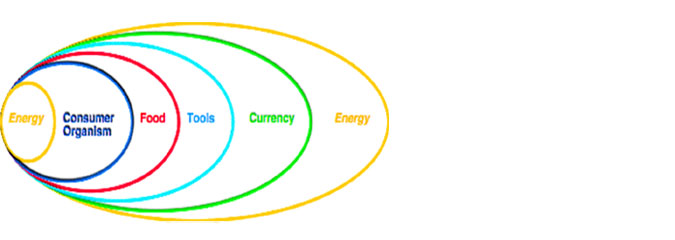“Although money affects all our lives and we deal with it every day, we understand very little about the role and importance of money and the international monetary system.”
Now, as a voice that is essentially speaking for the whole of the economics community, why would they say this? In the most general sense, the reason is because all economists still believe that their chosen field is a branch of sociology, when in reality, "economics" is an unrecognized branch of applied physics. In its essence, the economic process is a physical energy system. People work, they consume food, they buy fuel for the tool they use to get to work, and they work to buy food --or else the whole hamster wheel of progress quickly spins down to a halt.
Just as a quick test, for example, one merely needs to hypothetically subtract any one of, say, just three things to observe how the whole process immediately becomes unsustainable. These are: food, fuel and/or electrical power --each of which represents merely an alternative form of the same fundamental essence: energy.
For this reason, every aspect of modern economics can now be clearly defined and explained in terms of a system and process that is solely comprised of discrete energy forms and events. To food, fuel and electrical sources, for instance, we can also add human labor and the physics of mechanical industrial tools of all kinds. The Industrial Revolution --as a case in point-- was nothing more nor less than a revolution in applied physics: a revolution comprised of systems of tools (technologies) that proved to be of "economic" benefit simply because they directly magnified the effective energy of human labor. So if we slow down for just a moment to re-examine the whole continuum of events, it is not really very difficult to trace the continuous circulation of energy as it flows around the economic continuum, from one transitional state to another.
This is simply characteristic of the nature of physical reality everywhere, as a self-sustaining circle of energy processes. The laws of thermodynamics, for example, represents nothing more nor less than a set of purely economic principles: One expends energy in the hunt for food: food represents energy: the energy is incorporated by the consumer organism, etc. Energy is conserved, and the whole process manifests itself as an endlessly self-perpetuating, feedback energy system that began with the dawn of life on Earth (and of course, even arguably long before...). The relationship between any given consumer organism and its environment is therefore the prime template for the whole of economics: a reiterative process that reoccurs at every level of scale.
When the physics of tools are inserted into the process, the array of goods and services begins to proliferate, but the template remains completely unchanged in essence. For the fundamental "value" of tools --that is, any tool-- lies in the fact that it merely serves as a means to amplify the effective energy of any given consumer organism that may be utilizing them. That is, their "value" equals their applied force in every instance.
A farmer on a tractor (a tool that consumes energy in order to amplify the effective energy of the farmer) is a basic example of this very effect: the physics of "economics." But of course, if one is viewing all this from a 'sociological' perspective, economic events appear comprised of an endless, seemingly chaotic, and only loosely associated collection of "goods and services." This is a view fragmented by the absence of a common denominator.
On the surface of all this, we have a system to spontaneously account for every energy transaction: the money system. Money is a concept of representative, numerical, and thus abstract values, and this is naturally very different from the purely physical and utterly concrete nature of "value" (as in: What is the "value" of food) But because our economists have not yet glimpsed the underlying common denominator of events, the entire scope of economics has been preempted by monetary theories, and money --in and of itself-- is viewed as the heart and soul of the modern economy. But what is the true "value" of money? That it is also --and primarily-- a tool.
From a truly fundamental and completely integrative point of view, the economy is therefore not a money system at all --it's an energy system. The most fundamental principles of economics are entirely derived from the dynamics of energy --and not on the linear accounting principles of money. Appearances to the contrary, but consistent with universal experience, this is why the application of monetary theories have no net effect on states of economic decline.

No comments:
Post a Comment